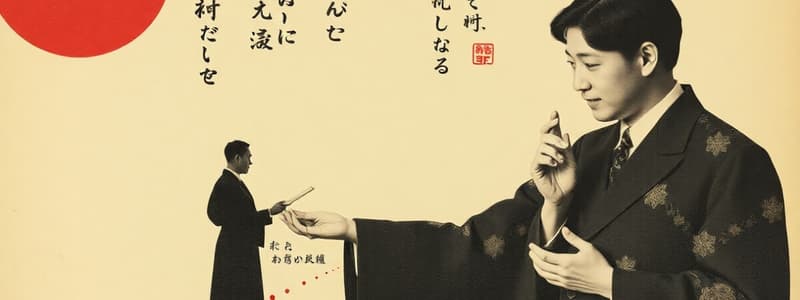Podcast
Questions and Answers
Which phrase is used formally to greet someone in the morning?
Which phrase is used formally to greet someone in the morning?
- Hajimemashite
- Konnichiwa
- Ohayō
- Ohayō gozaimasu (correct)
What is the informal equivalent of saying 'How are you?' in Japanese?
What is the informal equivalent of saying 'How are you?' in Japanese?
- Nǐ-ái (correct)
- Mata ne
- Ogenki desu ka?
- Konnichiwa
Which greeting is commonly used during the autumn season?
Which greeting is commonly used during the autumn season?
- Umi ni ikou
- Tsukimi (correct)
- Matsuri wa tanoshimi
- Akemashite omedetō gozaimasu
When addressing someone in a formal setting, what is generally recommended?
When addressing someone in a formal setting, what is generally recommended?
What is the meaning of the phrase 'Otsukaresama desu'?
What is the meaning of the phrase 'Otsukaresama desu'?
What is the meaning of 'Mata ne' in Japanese?
What is the meaning of 'Mata ne' in Japanese?
Which greeting is appropriate to use in a formal introduction?
Which greeting is appropriate to use in a formal introduction?
What does 'Akemashite omedetō gozaimasu' mean?
What does 'Akemashite omedetō gozaimasu' mean?
In which situation would you likely use 'Ogenki desu ka?'?
In which situation would you likely use 'Ogenki desu ka?'?
Which of the following is the correct informal greeting for 'good morning'?
Which of the following is the correct informal greeting for 'good morning'?
Which phrase indicates excitement about a festival in summer?
Which phrase indicates excitement about a festival in summer?
What is the traditional Japanese form of greeting during formal interactions?
What is the traditional Japanese form of greeting during formal interactions?
What does 'Sōka' express in casual conversation?
What does 'Sōka' express in casual conversation?
Study Notes
Formal Greetings
- Ohayō gozaimasu (おはようございます): Good morning (polite).
- Konnichiwa (こんにちは): Hello / Good afternoon.
- Konbanwa (こんばんは): Good evening.
- Hajimemashite (はじめまして): Nice to meet you (used during first introductions).
- Ogenki desu ka? (お元気ですか?): How are you? (polite).
Informal Greetings
- Ohayō (おはよう): Morning (casual).
- Yā (やあ): Hi (very casual).
- Nǐ-ái (元気?): Are you well? (casual).
- Sōka (そうか): I see (used when catching up).
- Mata ne (またね): See you later (casual farewell).
Seasonal Greetings
- Akemashite omedetō gozaimasu (明けましておめでとうございます): Happy New Year (formal).
- Umi ni ikou (海に行こう): Let's go to the beach (summer greeting).
- Tsukimi (月見): Moon viewing season greetings (autumn).
- Matsuri wa tanoshimi (祭りは楽しみ): I’m looking forward to the festival (common in summer).
Greeting Etiquette
- Bowing is the traditional form of greeting.
- Depth and duration of the bow indicate respect.
- Eye contact is less common in formal settings.
- Use titles and surnames, especially in professional contexts.
- Gifts are often exchanged with greetings during special occasions.
Common Phrases
- Arigatou gozaimasu (ありがとうございます): Thank you (polite).
- Sumimasen (すみません): Excuse me / I'm sorry.
- Itadakimasu (いただきます): Said before a meal, expressing gratitude for food.
- Otsukaresama desu (お疲れ様です): Thank you for your hard work (used among colleagues).
- Kitakara (来たら): When you come (used to greet someone arriving).
Formal Greetings
- Ohayō gozaimasu (おはようございます) is the polite way to say "good morning."
- Konnichiwa (こんにちは) is a general greeting, suitable for both afternoon and hello.
- Konbanwa (こんばんは) is used for "good evening."
- Hajimemashite (はじめまして) is used for "nice to meet you" during initial introductions.
- Ogenki desu ka?(お元気ですか?) is a polite way to ask "How are you?"
Informal Greetings
- Ohayō (おはよう) is the casual version of "good morning."
- Yā (やあ) is a very casual way to say "hi."
- Nǐ-ái (元気?) is a casual way to ask "Are you well?"
- Sōka (そうか) is a casual expression used when someone is catching up.
- Mata ne (またね) is a casual way to say "see you later."
Seasonal Greetings
- Akemashite omedetō gozaimasu (明けましておめでとうございます) is the formal way to say "Happy New Year."
- Umi ni ikou (海に行こう) is a summer greeting that means "Let's go to the beach."
- Tsukimi (月見) refers to the moon viewing season and is often used as a greeting in autumn.
- Matsuri wa tanoshimi (祭りは楽しみ) is a common summer greeting expressing excitement for festivals.
Greeting Etiquette
- Bowing is a traditional and important part of Japanese greetings.
- The depth and length of the bow indicate the level of respect.
- Eye contact is less common in formal settings.
- When addressing people formally, use titles and surnames.
- It's customary to exchange gifts during special occasions when greeting someone.
Common Phrases
- Arigatō gozaimasu (ありがとうございます) is the polite way to say "Thank you."
- Sumimasen (すみません) means "excuse me" or "I'm sorry."
- Itadakimasu (いただきます) is said before a meal to express gratitude for the food.
- Otsukaresama desu (お疲れ様です) is a phrase used to express appreciation for someone's hard work, especially among colleagues.
- Kitakara (来たら) is used to greet someone arriving and means "when you come."
Formal Greetings
- Ohayō gozaimasu (おはようございます): Polite way to say "good morning."
- Konnichiwa (こんにちは): General greeting suitable for both afternoon and hello.
- Konbanwa (こんばんは): Used for "good evening."
- Hajimemashite (はじめまして): Said during first introductions, meaning "Nice to meet you."
- Ogenki desu ka?(お元気ですか?): Polite way to ask "How are you?"
Informal Greetings
- Ohayō (おはよう): Casual version of "good morning."
- Yā (やあ): Very casual way to say "hi."
- Nǐ-ái (元気?): Casual way to ask "Are you well?"
- Sōka (そうか): Used when someone is catching up, meaning "I see."
- Mata ne (またね): Casual way to say "see you later."
Seasonal Greetings
- Akemashite omedetō gozaimasu (明けましておめでとうございます): Formal way to say "Happy New Year."
- Umi ni ikou (海に行こう): Summer greeting that means "Let's go to the beach."
- Tsukimi (月見): Greeting used during autumn, referring to the moon viewing season.
- Matsuri wa tanoshimi (祭りは楽しみ): Common summer greeting expressing excitement for festivals.
Greeting Etiquette
- Bowing: Traditional form of greeting. Depth and duration of the bow indicate respect.
- Eye Contact: Less common in formal settings.
- Titles and Surnames: Used in professional contexts.
- Gifts: Often exchanged during greetings for special occasions.
Common Phrases
- Arigatō gozaimasu (ありがとうございます): Polite way to say "Thank you."
- Sumimasen (すみません): Means "excuse me" or "I'm sorry."
- Itadakimasu (いただきます): Said before a meal to express gratitude for food.
- Otsukaresama desu (お疲れ様です): Expresses appreciation for someone's hard work, especially among colleagues.
- Kitakara (来たら): Used to greet someone arriving, meaning "when you come."
Studying That Suits You
Use AI to generate personalized quizzes and flashcards to suit your learning preferences.
Description
Explore a variety of Japanese greetings, including formal, informal, and seasonal expressions. Learn the importance of bowing and etiquette when greeting others in Japanese culture. Test your knowledge and enhance your understanding of these essential phrases.




